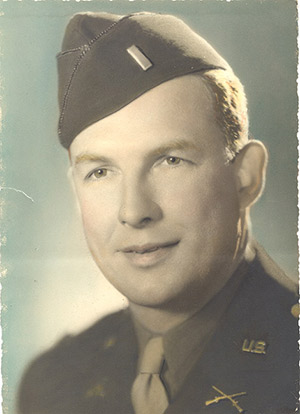Harold L. Nonamaker
Harold Nonamaker attended the R.O.T.C. program at Kansas State College, graduating in 1932. Following his graduation Harold did not enter active duty right away. He and his wife Marjorie moved to Smith Center, Kansas where he worked in the local Social Security office and later in the Farm Security Administration.
After the war broke out Harold went onto active duty in February 1942. Though he served for a time in the States at Fort Benning in Georgia, by November of that year Harold was taking part in one of the United States' first engagements in Europe: Operation Torch – the invasion of North Africa. While not on duty Harold spent much time exploring Arab villages, absorbing the culture and writing home to his wife Marjorie about his experiences.
Harold remained with his unit in North Africa throughout all of 1943 and did not ship out again until 1944 when the Allies were making their drive through France. By the end of the year Harold was stationed with the American troops on the German border, poised in the spring to take part in the invasion of Germany itself.
American plans were thrown into disarray, however, when the Germans suddenly launched a massive surprise counter-offensive in the Ardennes Forrest on December 16, 1944. The Germans, in a last-ditch effort to halt the Allied advance, smashed into primarily American lines in Belgium, Luxemburg, and Northeastern France and quickly overwhelmed the American troops. The offensive came to be known as “The Battle of the Bulge” after the massive bulge the Germans forced into Allied lines. Within the first few days tens of thousands of surprised American troops were forced to surrender. Harold and his unit were among the many captured that December.
It was a tense few weeks for Harold’s wife Marjorie, who had been accustomed to sending and receiving many letters from her husband overseas. The Army eventually sent word that Harold was missing in action. It was not until late January 1945 that Harold managed to send word that he was alive and unharmed, but living as a prisoner in Germany.
One of the last communications Marjorie received from Harold arrived by postcard from Germany dated February 24, 1945. Harold writes: “I am well. Get hungry at times. Wish I could eat your good meals again. Make up for it when I get back. Surely this war can’t go on much longer.”
Tragically, Harold would never make it home. On April 5, 1945 Harold and his comrades were being marched to a new prisoner of war camp when they were accidentally hit by Allied bombs. The planes were targeting a nearby munitions factory outside Nuremburg and had no idea prisoners happened to be marching by. Marjorie was not informed of her husband’s fate until June 6, 1945 – nearly a month after the war in Europe came to an end.



